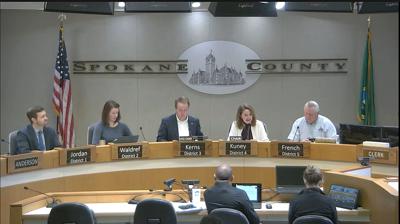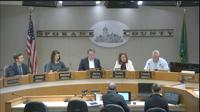(The Center Square) – Spokane County commissioners have unanimously approved a $936.8 million budget for 2024 that they say will bolster public safety and criminal justice support without raising additional taxes.
The new budget includes funding for:
-- a new superior court judge and support personnel;
-- patrol vehicle replacements – and a replacement protective “bomb suit” -- for the sheriff’s office;
-- information technology improvements, including continued implementation of a new tech system for personnel, financial, and payroll systems;
-- improved vault security and a microfilm reader in the clerk’s office;
-- a new intercom system, module cameras, control room, and a transport vehicle for detention services.
Adding a 13th judge to Spokane’s superior court system was particularly welcomed by commissioners Chris Jordan, Amber Waldref, and Al French.
“I’m hopeful it will result in faster case processing in the criminal justice system (and) access to justice,” Jordan said during Monday’s hearing.
Waldref noted that it has been two decades since Spokane County received state approval for an additional judge, but local funding had not been forthcoming until now. In Washington, the state and presiding county split the cost of a superior court judge’s salary, which is currently $217,391 a year. Additionally, the county will be funding a court reporter position, deputy clerk, and judicial assistant for the new court team.
“I am really pleased that this budget funds public safety and criminal justice at the highest level it’s ever been,” said French. “That reflects my values: keeping citizens safe (and) making criminal justice work better and fairer for everybody.”
French noted that Spokane County has enjoyed a growing economy with over $1 billion dollars in new investments during the past four years that have contributed to a property tax base with an assessed valuation of $93 billion and the best credit rating of a county its size in Washington.
Last week, French and fellow commissioners Josh Kern and chairperson Mary Kuney rejected a motion to raise the county’s property tax limit by a state-allowable 1% for 2024. They outvoted Waldref and Jordan, who supported the proposal, saying it would only increase property taxes about $3 a year for the average homeowner but provide an estimated $638,000 in additional revenue that could be dedicated to retaining staff and filling personnel vacancies, particularly in the public safety sector.
On Monday, French said current and past commissioners have worked hard over the past decade to make county government more efficient and streamlined without significantly increasing staffing. “We haven’t reduced services; we found ways to do things smarter (and) better,” he said.
Kerns said the county did not have to rely on any “gimmicks” or tax increases to achieve a balanced budget in 2024. Under state law, cities and counties in Washington must adopt a balanced budget by Dec. 31 for the coming year. “The budget is important to allow us to do the people’s business and live within the people’s means,” he said.
Kunes echoed Kerns’ and French’s comments.
Jordan and Waldref said they are appreciative of funding for several capital projects planned next year. Those include new tennis courts at Linwood Community Park, a new park in West Plains, campground renovation at Liberty Lake regional park, upgrades to Avista Stadium, field improvements and stormwater upgrades at Plantes Ferry, the Doris Morrison Learning Center at Saltese Flats, and county campus improvements under the state’s “Green Buildings Act.”
Jordan and Waldref did express disappointment at being outvoted Monday on their proposals to use a portion of the county’s $1 million-plus discretionary funds account. Waldref asked for a $100,000 allocation to add signage, video displays, and other measures to improve access for non- or limited-English speakers to navigate the courthouse and county offices. Jordan asked for $25,000 to support a Pre-Employment Preparation program that supports training for persons seeking apprenticeships and work in the construction trades industries.
Both are important, said Kuney and French, but more discussions and specifics are needed in the new year before allocating funds.
Overall, the county’s $937 million budget is comprised of six principal funds:
-- current expense or general fund, $265 million, which provides the most discretionary, non-dedicated monies typically used for personnel in law enforcement, planning, parks, and administration;
-- capital projects, $55 million, including campus and park improvements;
-- enterprise funds, $128 million, accounts using fees and specific management such as golf courses, the interstate fair, sewer, and aquifer protection areas;
-- special revenue funds, $375 million, utilizing dedicated revenues for specific purposes including county roads and mental health services;
-- internal services, $92 million, for various employee insurance programs and workers compensation payments.
Revenues to the county come in the form of property taxes, state and federal grants, road/gasoline taxes, 911 communications levies, real-estate excise taxes, and economic development monies.









